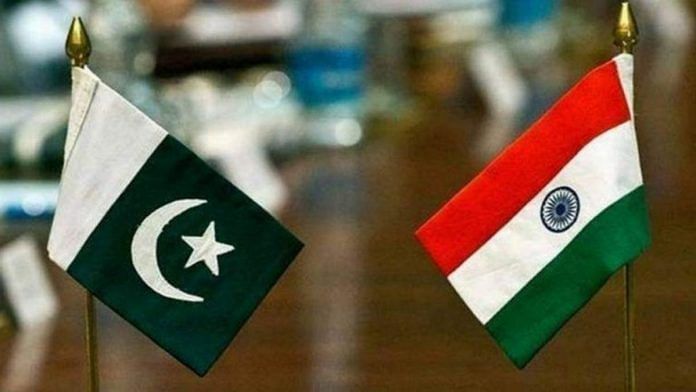New Delhi: Even as India is waiting to hear from Pakistan on its 25 January notice to modify the Indus Waters Treaty (IWT), ThePrint has learnt that New Delhi has more or less made up its mind that as far as the ongoing Court of Arbitration (CoA) proceedings related to the Kishanganga and Ratle hydroelectric projects are concerned, it will not accept any interim measure or ex-parte decision.
India and Pakistan have been involved in a dispute over the two hydroelectric projects in Jammu & Kashmir on the shared Indus river basin related to drawdown flushing for passing sediment downstream, storage capacity of reservoirs, among other things. While three disputes are related to the Kishanganga project, four are related to the Ratle project.
Pakistan has alleged that the projects violate the IWT and will reduce the water flowing into its territory.
The IWT, which was brokered between India and Pakistan by the World Bank in 1960, outlines how the two countries will utilise the six rivers of the shared Indus river system. While the western rivers of the system — Indus, Jhelum and Chenab — fall in Pakistan’s share, the three eastern ones — Ravi, Beas and Sutlej — are to be used by India.
The latest friction started after the World Bank appointed a neutral expert on the request of India, and set up the CoA on the request of Pakistan in October 2022 to resolve the dispute related to the two projects.
India objected to the World Bank’s move to initiate the two parallel mediation processes simultaneously and refused to participate in the proceedings of the CoA, which is currently looking at the objections raised by Pakistan over the two projects.
Under IWT provisions, the CoA consists of seven arbitrators, where two are appointed by India and Pakistan each. India has not appointed its two arbitrators so far.
Ahead of the first proceedings of the CoA that took place on 27 January in the Hague, in which it did not participate, India on 25 January shot off a notice to Pakistan to renegotiate the treaty.
Pakistan has to respond to the notice within 90 days.
Also Read: Why India wants to modify Indus Waters Treaty with Pakistan
What interim measures can the COA lay?
Sources in the government said that among the interim measures the CoA could announce before a final award was given in the dispute, was putting a stay on the construction of the 850-MW Ratle project and temporarily stay the production of power generation from the 330-MW Kishanganga project, which was commissioned in 2018.
Unlike the neutral expert, the CoA can order a stay on a project.
One of the sources said that India is of the view that the constitution of the CoA “was not proper” and violates the provisions for graded dispute resolution specified under the IWT.
According to the graded resolution, when a issue arises it is first taken to the Permanent Indus Commission (PIC), comprising of two commissioners from India and Pakistan, respectively. If the PIC is unable to resolve the difference, then either party can take it to a neutral expert. If both the commissioners agree that the dispute requires the interpretation of the IWT, then it goes to the CoA.
“However, according to the provisions of the IWT, a matter can go to the CoA under two conditions — if both the commissioners of the Permanent Indus Commission agree that the issue is legal in nature (not clearly written in treaty), or the neutral expert refers the matter to the CoA. But in the present case, both the options were not followed and Pakistan unilaterally dragged India to the CoA,” said the source.
India has held that the unilateral action by Pakistan is in contravention of Article IX of IWT that spells out the graded mechanism of dispute resolution.
“India did not join the CoA proceedings as it is clear in its view that it (CoA) was constituted against the provisions of the IWT. That is why Indian will not accept any interim measure or final award given by the CoA,” a second source said. “In our communication to Pakistan on 25 January, we have asked for modifying the treaty in view of the confusion about the graded dispute resolution mechanism.”
A third government source said that with more than a dozen projects — either being planned or where work has started — on the western and eastern rivers of the Indus river basin, India is concerned that any adverse decision could imperil them all.
“That is why we want to renegotiate the treaty,” the source pointed out.
Not the first time
It’s not the first time that the World Bank has started two parallel processes of dispute resolution under the IWT.
In 2016, the World Bank initiated the process of appointing a CoA on the demand of Pakistan and a neutral expert on India’s request to resolve the dispute over the two projects.
But the organisation had to “pause” the mediation process after India’s objections.
In April 2022, the World Bank lifted the pause and again initiated the parallel mediation processes of appointing a neutral expert at India’s request and setting up a CoA on Pakistan’s plea.
The IWT has survived so far despite three wars and several ups and downs in India-Pakistan ties. It came under strain after the 2016 attack on an army camp in Kashmir’s Uri where 19 Indian soldiers were killed by Pakistani militants.
The attack had led India to announce emphatically its decision to exercise its right to make full use of its share of water as specified under the IWT.
(Edited by Nida Fatima Siddiqui)
Also Read: 100 mn hectares going to waste, govt to bring land & water schemes together to fix problem



